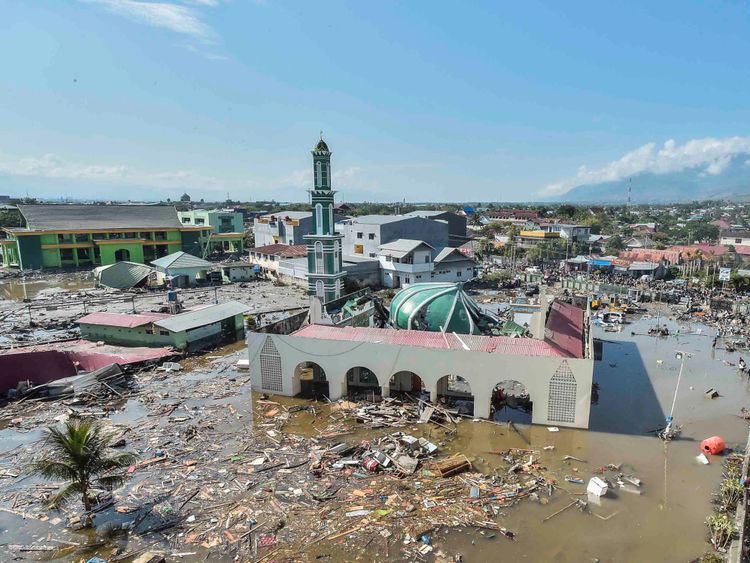Britain will send a team of experts and humanitarian aid to Indonesia to help with the earthquake and tsunami relief effort as desperate survivors beg for help.
International Development Secretary Penny Mordaunt told Sky News that the UK had been asked to help and would be sending experts to co-ordinate efforts on the ground.
She added: “I have made an initial £2m of UK aid support available to help meet immediate needs of the most vulnerable people.”
Meanwhile, Sky News’ defence correspondent Alistair Bunkall has revealed that Britain is considering sending HMS Albion or HMS Argyll to help relief efforts.
:: Why Indonesia has so many earthquakes
It comes after footage emerged of women, children and babies crying and screaming for help at one airport, begging to be taken on board planes away from the devastation.
One woman told TVOne: “We have not eaten for three days. We just want to be safe.”
According to UN estimates, some 191,000 are in urgent need of help.
Mass burials have begun for the 844 victims found so far, with warnings that hundreds – possibly thousands – more are buried in mud and trapped under collapsed buildings.
Describing the earthquake, one survivor said tearfully: “The ground rose up like a spine and suddenly fell. Many people were trapped under collapsed houses. I could do nothing to help.”
They added: “In the evening, some of them turned on their mobile phones just to give a sign that they were there. But the lights were off later and the next day.”
National disaster agency spokesman Sutopo Purwo Nugroho said: “The casualties will keep increasing.”
He added that “there are still hundreds of victims buried in mud”.
A lack of machinery has slowed down the search and around 60 people are believed to still be buried under one hotel in Palu – the city of more than 300,000 where most of the dead have so far been found.
Two survivors have been pulled from the 80-room Hotel Roa-Roa and there are hopes more could be alive after calls for help were heard.
People have been forced to loot shops for food and water, saying aid has not yet reached them, while families search open-air morgues in the baking sun to try to find their loved ones.
One survivor, Adi, said he was hugging his wife by the beach when the tsunami wave – which measured up to 6m (20ft) – struck land.
“When the wave came, I lost her,” he said. “I was carried about 50 metres. I couldn’t hold anything. The water was spinning me around,” he said.
“This morning I went back to the beach, I found my motorbike and my wife’s wallet.”
Some 1,200 inmates have also escaped from three prisons in the region, according to authorities.
Speaking from Palu, Sky’s southeast Asia correspondent Siobhan Robbins said people were combing debris for anything they could salvage.
“People are still coming back to pick through remnants of their old lives, or even if they didn’t live here, to find stuff that could help them survive,” she said.
“Many people here are either in refuge centres or have tried to escape the city in huge traffic jams just to get somewhere safe, but they say there’s no power, there’s little water and they’re running out of food.”
Donggala, north of Palu and home to around 300,000 people, was near the quake’s epicentre but has been cut off since the disaster happened.
Tsunami warning systems set up after the 2004 tsunami – that killed 168,000 people in Indonesia – appeared to have failed.
A spokesman for the National Disaster Mitigation Agency said none of Indonesia’s tsunami buoys, one way of detecting the waves, had been working since 2012. He blamed of a lack of funding.
Indonesia sits on the “Ring of Fire”, an area around the Pacific prone to earthquake and volcanic activity because of the movement of the Earth’s tectonic plates.
From – SkyNews


